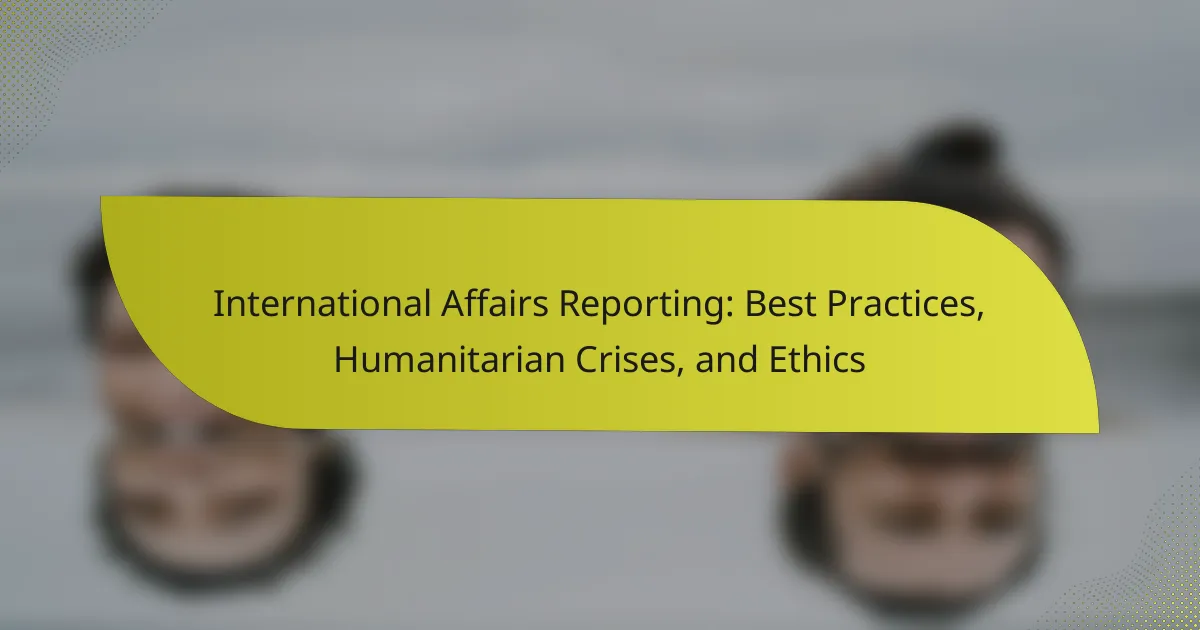International affairs reporting requires a dedication to accuracy, cultural sensitivity, and ethical standards, enabling journalists to effectively navigate complex global issues. In covering humanitarian crises, it is essential to prioritize empathy and context, ensuring that human experiences are highlighted while providing necessary background information. Upholding ethical considerations is crucial for maintaining credibility and respect for affected individuals, emphasizing the importance of privacy, avoiding sensationalism, and ensuring transparency in reporting.
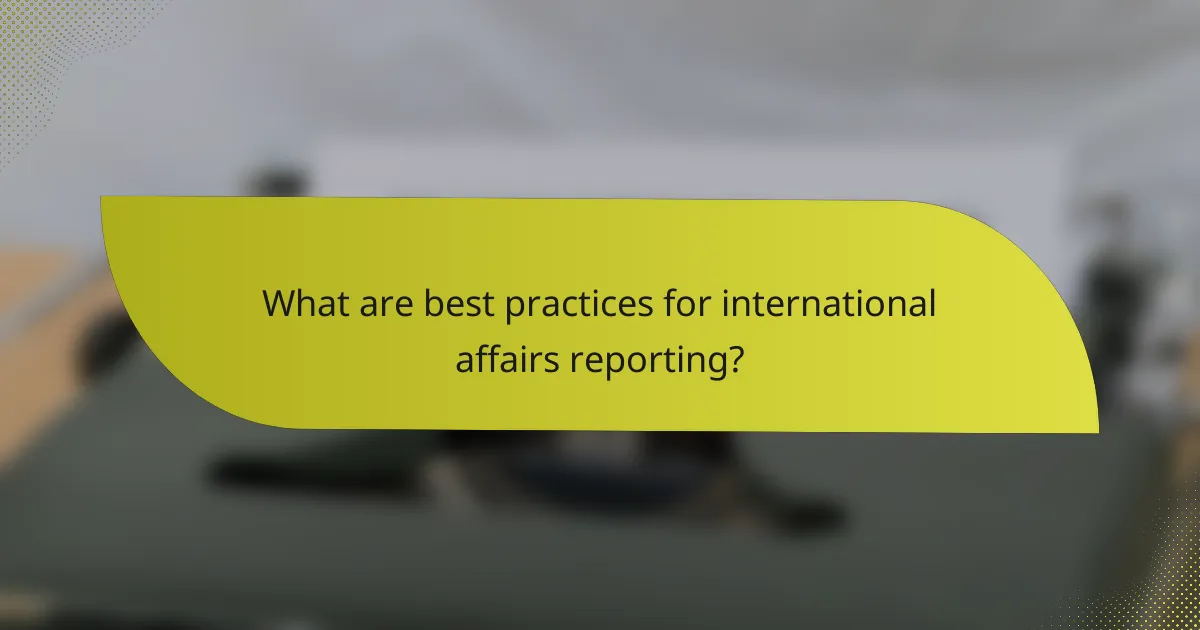
What are best practices for international affairs reporting?
Best practices for international affairs reporting involve a commitment to accuracy, cultural sensitivity, and ethical standards. Journalists must navigate complex global issues while ensuring their reporting is reliable and respectful of the communities they cover.
Accuracy and fact-checking
Accuracy is paramount in international affairs reporting. Journalists should verify facts through multiple credible sources before publication to avoid misinformation. Implementing a rigorous fact-checking process can help maintain the integrity of the report.
Utilizing tools like fact-checking websites and databases can aid in confirming statistics and claims. Establishing a network of reliable contacts in various regions can also enhance the accuracy of the information gathered.
Understanding cultural contexts
Understanding cultural contexts is essential for effective reporting on international affairs. Journalists should familiarize themselves with the historical, social, and political nuances of the regions they cover to avoid misinterpretation of events and sentiments.
Engaging with local experts or cultural advisors can provide valuable insights. This helps ensure that the reporting is not only accurate but also respectful of local customs and values.
Utilizing diverse sources
Utilizing diverse sources enriches international reporting by providing multiple perspectives on a story. Journalists should seek out voices from various backgrounds, including local journalists, activists, and community leaders, to create a more comprehensive narrative.
Incorporating viewpoints from different demographics can highlight underrepresented issues and foster a deeper understanding of the complexities involved in international affairs.
Engaging with local communities
Engaging with local communities is crucial for authentic reporting. Journalists should prioritize building relationships with community members to gain trust and access to firsthand accounts of events.
Participating in community events or forums can facilitate this engagement. Listening to local concerns and stories ensures that the reporting reflects the realities faced by those directly affected by international issues.
Adhering to journalistic ethics
Adhering to journalistic ethics is fundamental in international affairs reporting. Journalists should follow established ethical guidelines, such as those set by the Society of Professional Journalists, which emphasize accuracy, fairness, and accountability.
Transparency about sources and potential conflicts of interest is vital. Journalists must also be mindful of the potential impact their reporting may have on vulnerable populations, striving to report responsibly and sensitively.
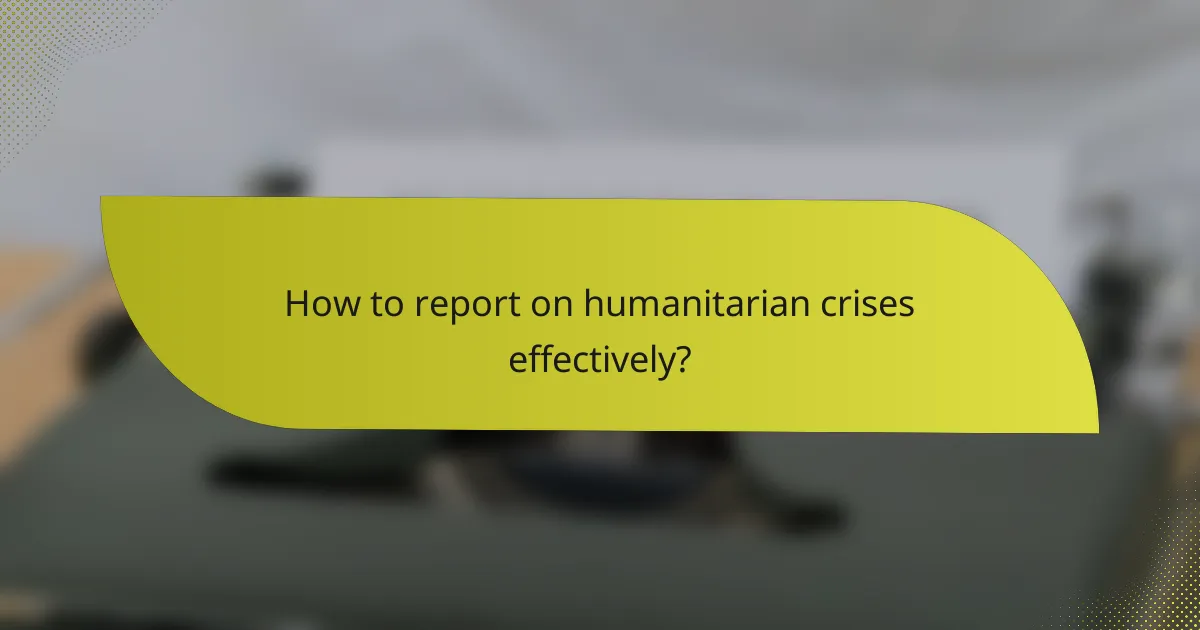
How to report on humanitarian crises effectively?
Effective reporting on humanitarian crises involves a commitment to accuracy, empathy, and context. Journalists must prioritize human experiences while providing comprehensive background information to inform audiences about the complexities of the situation.
Prioritizing human stories
Focusing on individual narratives brings the human aspect of crises to the forefront, making the issues more relatable. Highlighting personal experiences can evoke empathy and drive action from the audience. For instance, sharing a survivor’s journey can illustrate the broader impact of a disaster.
When selecting stories, consider diversity in experiences to represent various perspectives within the crisis. This approach helps avoid stereotypes and provides a fuller picture of the situation.
Collaborating with NGOs
Partnering with non-governmental organizations (NGOs) can enhance the accuracy and depth of reporting. NGOs often have on-the-ground insights and access to affected communities, which can enrich journalistic narratives. Establishing relationships with these organizations can lead to valuable information and resources.
When working with NGOs, ensure that their goals align with ethical reporting standards. Transparency about the collaboration can also build trust with the audience.
Providing context and background
Contextualizing humanitarian crises is crucial for audience understanding. Providing historical, political, and social background helps explain why a crisis is occurring and its implications. For example, discussing the root causes of a conflict can clarify the ongoing challenges faced by affected populations.
Utilize data and expert opinions to support your context. Incorporating statistics and historical timelines can help illustrate trends and patterns that contribute to the current situation.
Ensuring sensitivity in language
Using sensitive language is vital when reporting on humanitarian crises. Avoid language that may stigmatize or dehumanize affected individuals. Instead, use terms that respect their dignity and humanity, such as “people affected by the crisis” rather than “victims.”
Be mindful of cultural nuances and local terminology. Researching preferred language and terms used by the communities involved can foster respect and understanding in your reporting.

What ethical considerations should journalists keep in mind?
Journalists covering international affairs must prioritize ethical considerations to maintain credibility and respect for affected individuals. Key principles include respecting privacy, avoiding sensationalism, and ensuring transparency in reporting.
Respecting privacy and dignity
Respecting the privacy and dignity of individuals affected by humanitarian crises is paramount. Journalists should avoid disclosing personal information that could lead to harm or stigmatization. For instance, when reporting on refugees, it is crucial to anonymize identities unless consent is explicitly given.
Additionally, journalists should consider the emotional and psychological impact of their reporting on vulnerable populations. Using sensitive language and imagery can help protect the dignity of those involved while still conveying the gravity of the situation.
Avoiding sensationalism
Avoiding sensationalism is essential in ethical journalism, particularly in humanitarian reporting. Sensationalized stories can distort reality and contribute to misinformation. Journalists should focus on factual reporting and provide context rather than exaggerating events for dramatic effect.
For example, instead of using shocking headlines that may mislead readers, journalists can present clear, factual accounts that highlight the human experience behind the crisis. This approach fosters a more informed audience and encourages empathy.
Transparency in reporting
Transparency in reporting involves clearly communicating sources, methods, and potential biases to the audience. Journalists should disclose where information comes from and acknowledge any limitations in their reporting. This builds trust and credibility with readers.
Moreover, being transparent about the challenges faced in gathering information, especially in conflict zones, can help audiences understand the complexities involved. Journalists should strive to provide balanced perspectives, ensuring that multiple voices are heard in their narratives.
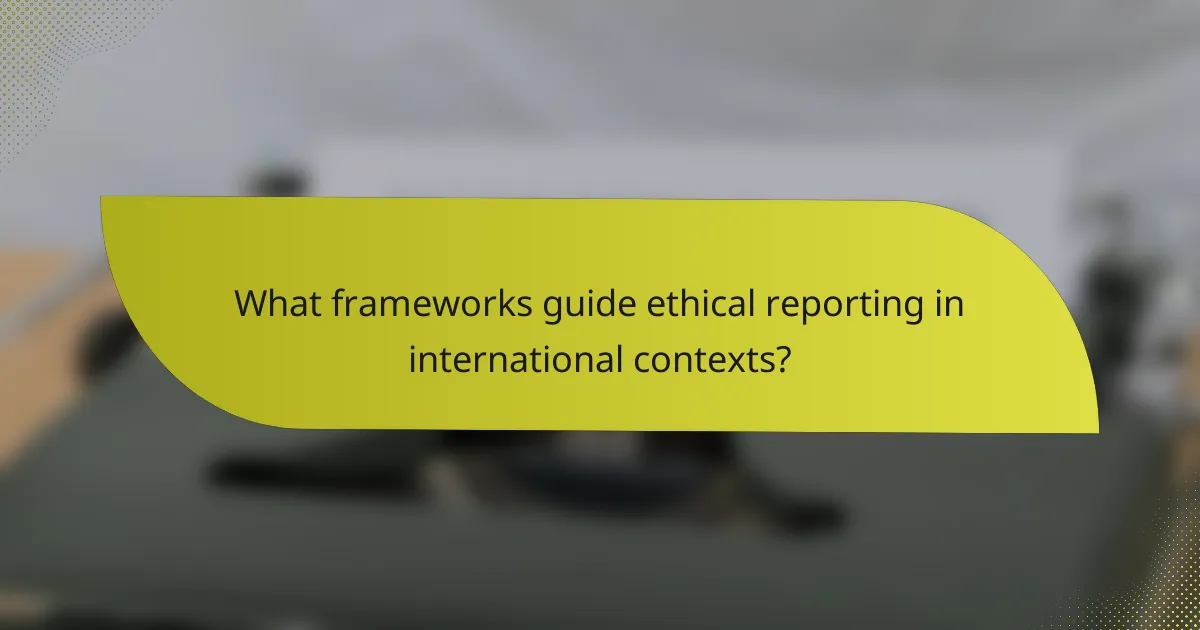
What frameworks guide ethical reporting in international contexts?
Ethical reporting in international contexts is primarily guided by established frameworks that emphasize accuracy, fairness, and respect for human dignity. These frameworks help journalists navigate complex situations, ensuring that their reporting adheres to high ethical standards while addressing humanitarian crises.
International Federation of Journalists guidelines
The International Federation of Journalists (IFJ) provides a comprehensive set of guidelines that promote ethical journalism globally. These guidelines stress the importance of accuracy, accountability, and the protection of sources, particularly in conflict zones and humanitarian crises.
Journalists are encouraged to verify information from multiple sources before publication and to consider the potential impact of their reporting on vulnerable populations. For instance, when covering a humanitarian crisis, reporters should avoid sensationalism and focus on the human stories behind the statistics.
Society of Professional Journalists Code of Ethics
The Society of Professional Journalists (SPJ) Code of Ethics outlines key principles for ethical journalism, including seeking truth, minimizing harm, and acting independently. This code is particularly relevant in international reporting, where the stakes can be high and the consequences of misinformation severe.
Journalists should strive to provide context and avoid biases that could misrepresent the situation. For example, when reporting on refugee crises, it is crucial to portray the experiences of individuals accurately and sensitively, rather than reducing them to mere statistics. Adhering to these ethical standards fosters trust and credibility in international journalism.
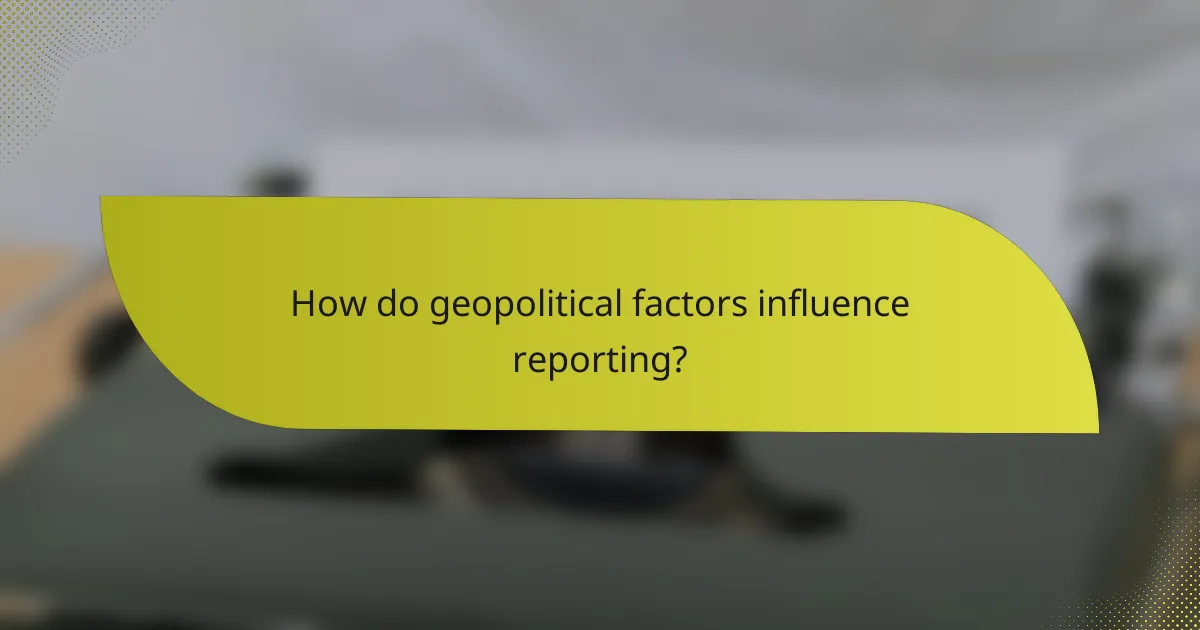
How do geopolitical factors influence reporting?
Geopolitical factors significantly shape international reporting by affecting access to information, the framing of narratives, and the safety of journalists. These influences can determine which stories are told and how they are perceived by global audiences.
Impact of government censorship
Government censorship can severely restrict the flow of information, impacting what journalists can report. In countries with strict media controls, reporters may face legal repercussions for covering sensitive topics, leading to self-censorship or reliance on unofficial sources.
For instance, in nations where dissent is not tolerated, journalists might avoid reporting on protests or human rights abuses to evade government scrutiny. This creates a gap in public knowledge, often skewing perceptions of the situation on the ground.
Role of international organizations
International organizations, such as the United Nations or the International Committee of the Red Cross, play a crucial role in shaping narratives during humanitarian crises. They often provide vital information, resources, and frameworks that journalists can utilize to report accurately and responsibly.
These organizations can also facilitate access to conflict zones, offering journalists the necessary support to cover stories that might otherwise be inaccessible. Collaborating with these entities can enhance the credibility and depth of reporting, ensuring that critical issues receive the attention they deserve.
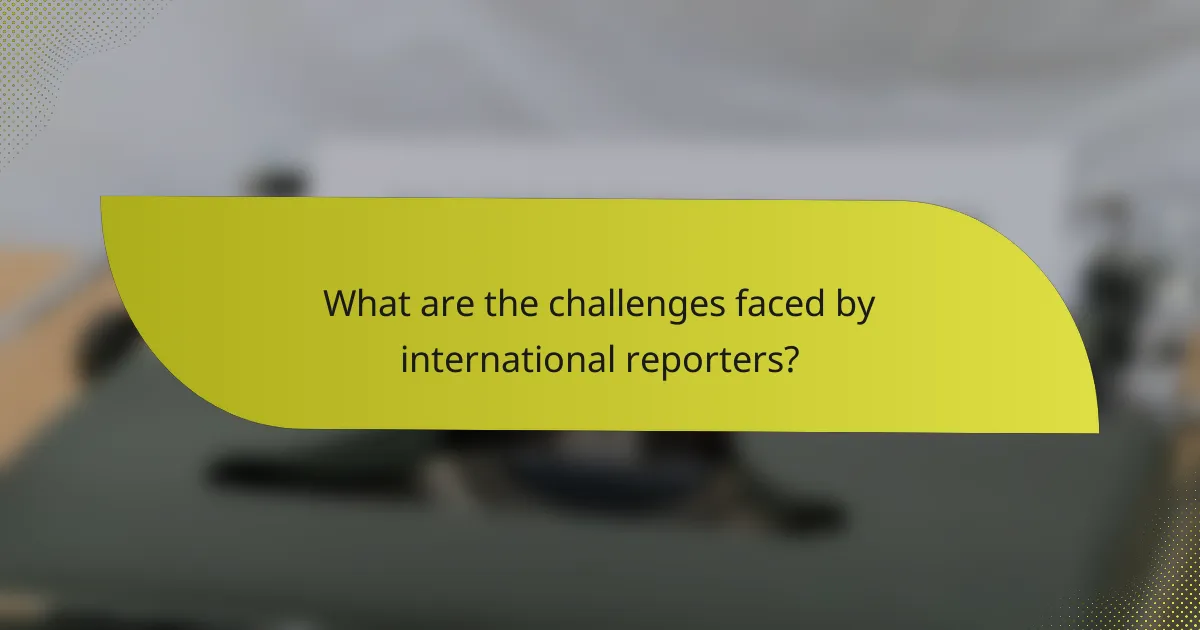
What are the challenges faced by international reporters?
International reporters encounter numerous challenges that can hinder their ability to deliver accurate and timely news. These obstacles include political instability, language barriers, and ethical dilemmas, all of which can complicate the reporting process.
Political instability and conflict zones
Reporting from politically unstable regions or conflict zones poses significant risks, including threats to personal safety and difficulties in accessing reliable information. Journalists must navigate complex security situations, often relying on local contacts and networks to gather news while ensuring their own protection.
In such environments, it’s crucial for reporters to stay informed about the local political landscape and understand the potential biases of their sources. They should prioritize safety measures, such as using secure communication tools and establishing evacuation plans.
Language barriers
Language differences can hinder effective communication and understanding, making it challenging for reporters to accurately convey stories. Journalists may need to work with interpreters or learn basic phrases in the local language to facilitate interactions with sources and communities.
To overcome language barriers, reporters should invest time in cultural immersion and language training. This not only enhances their reporting but also builds trust with local populations, allowing for deeper insights into the stories they cover.
Ethical dilemmas
International reporters often face ethical dilemmas, particularly when covering sensitive topics such as humanitarian crises. Balancing the need for compelling stories with respect for the dignity of individuals affected by crises is essential.
Reporters should adhere to established ethical guidelines, such as those from the Society of Professional Journalists, which emphasize accuracy, fairness, and minimizing harm. Engaging with local communities and obtaining informed consent can help navigate these ethical challenges effectively.
